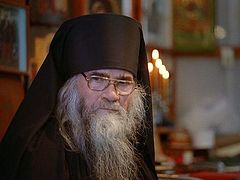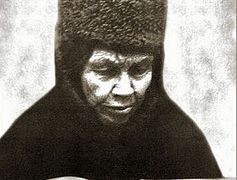 Blessed Fools-for-Christ Mikhail and Nikolai. Photo: Anatoly Goriainov
Blessed Fools-for-Christ Mikhail and Nikolai. Photo: Anatoly Goriainov
I was also fortunate to meet Nikolai Trubin. Back in the day, he used to live near the Pskov Caves Monastery. Many people remember him well. He was already called blessed, and anyone who had ever visited Pechory could tell their own story about him. People said that long before setting out on a path of foolishness-for-Christ, he taught at a seminary. In other words, he was like of those mysterious persons I read about before in an old book on fools-for-Christ. When I came to the Pskov Caves Monastery for the first time, I really wanted to meet him.
“Summer and winter alike, he wears a thick dark blue woolen coat—remember, the kind our fathers used to wear,” my friend Katya who had already been to Pechory described him to me. However, no matter how hard I tried to find Nikolai in a crowd of the faithful he was nowhere to be seen, and after a week I forgot about it. But then one day, as I was at church, I suddenly turned around and saw a man kneeling in the middle of the church with his head tilted to one side. “But here he is, Nikolai!” I immediately recognized him.
When I came to Pechory another time, to be united in Holy Matrimony with my husband (with Fr. Adrian’s blessing), my friend Liudochka and I (she was my maid of honor) entered a tiny deserted chapel. That’s where I saw Nikolai again. Everyone called him Nikolka. He was standing at an analogion, reading the Psalter in front of the icons. He was in his usual attire: a dark blue woolen coat, and his hair so matted it formed a tangled mass. “His hair looks like that because he sleeps on the ground and never takes a shower,” seasoned pilgrims used to say about him. Does he sleep on the ground or never take a shower? Well, why then do we smell a remarkably delicate fragrance in his presence?
When he saw us, Nikolai called me to come closer and handed me the Psalter:
“Read this”, he said.
“What do you mean? I can’t!” “Just read”, he insisted.
I stared at the letters, familiar yet strange at the same time,[1] and tried to read the first word. I did it all wrong! The second one was just as hard as the first one. “I don’t think I can ever make it sound right!” the stubborn thought was running through my mind and I kept pushing the book back to its owner but Nikolai stood nearby correcting my errors. Suddenly, the words flowed easily and fluently, as if I had been reading Church Slavonic all my life. But then Nikolai took the Psalter away from me and handed it over to Liudochka. At first, she was at a loss, too, but soon enough she could read quite fluently. No wonder, for she had studied at the School of Language Arts. After that, Nikolai filled two buckets of water from a spring and handed them to us, saying:
“Go and pour it over yourselves.”
“How’s that, ‘pour it over ourselves?’”
“Just like that”, was his reply.
We left the chapel, turned the corner, and walked up a path. Then, without haste, we “simply” got undressed and doused ourselves with a bucket of ice-cold water. We heard voices far off but no one was on the path we were on.
A few years later in Zagorsk [the soviet-era name for Sergiev Posad, where the Holy-Trinity St. Sergius Lavria is located], I saw a neatly dressed priest with rich long hair pulled together with a rubber band. He was standing not far from the railway station surrounded by a crowd of people. It was Nikolai—there was no mistaking him. I came up for a blessing telling how him grateful I was for meeting him earlier, and then asked where he is now. He said that he was serving in Kirovograd, Ukraine. We talked for a little while and then parted ways. This time around, we parted forever: I learned not long ago that Fr. Nikolai died in 1997.




